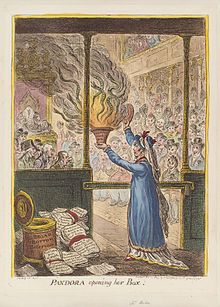პანდორას ყუთი
პანდორას ყუთი — ყოველმხრივ უბედურებათა წყარო (პანდორე–სიტყვასიტყვით ყოველმხრივ დაჯილდოვებულს ნიშნავს).

ისტორია
რედაქტირებაპრომეთეზე განრისხებულმა ზევსმა უბრძანა ჰეფესტოს, შეემქნა ქალი პანდორა, როგორც კაცობრიობის სასჯელი. ჰეფესტომ მიწისა და წყლისგან შექმნა არსება,რომელსაც ქალღმერთის გარეგნობა და ადამიანის ხმა ჰქონდა, ქალღმერთმა აფროდიტემ პანდორას სინარნარე და მომხიბვლელობა დაანათლა; ჰერმესმა – ეშმაკობა და ვერაგობა; ათენა პალადამ კი ხელსაქმე ასწავლა. პრომეთე გრძნობდა რა მოახლოებულ საშიშროებას, გააფრთხილა თავისი ძმა ეპიმეთევსი, არ მიეღო საჩუქარი ზევსისგან. მიუხედავად პრომეთეს გაფრთხილებისა, ეპიმეთევსმა ცოლად შეირთო პანდორა. ზევსმა საჩუქრად მისცა პანდორას დახურული ყუთი და გააფრხილა, რომ არ გაეხსნა, მაგრამ ვინაიდან ღმერთებმა პანდორას ცნობისმოყვარეობაც დაანათლეს, მან ძალაუნებურად გახსნა ყუთი. გახსნა რა ყუთი, ამოფრინდა ყველანაირი ბოროტება, სიავე, ავადმყოფობა და გავრცელდა მთელ მსოფლიოში. შეშინებულმა პანდორამ ყუთი დახურა და ერთადერთი რაც ყუთში დარჩა, აღმოჩნდა იმედი. ამის შემდეგ ბოლო მოეღო ადამიანთა უდარდელ და ბედნიერ ცხოვრებას. სწორედ აქედან წარმოიშვა და გავრცელდა გამოთქმა – “პანდორას ყუთი“, რომელიც ყოველგვარ უბედურებათა წყაროს ნიშნავს.
წყაროები
რედაქტირება- Apostolos Athanassakis, Hesiod: Theogony, Works and Days and The Shield of Heracles. Translation, introduction and commentary, Johns Hopkins University Press, Baltimore and London, 1983. Cf. P.90
- Hesiod; Works and Days, in The Homeric Hymns and Homerica with an English Translation by Hugh G. Evelyn-White, Cambridge, MA.,Harvard University Press; London, William Heinemann Ltd. 1914. Online version at the Perseus Digital Library.
- Lamberton, Robert, Hesiod, New Haven: Yale University Press, 1988. ISBN 0300040687. Cf. Chapter II, "The Theogony", and Chapter III, "The Works and Days", especially pp. 96–103 for a side-by-side comparison and analysis of the Pandora story.
- Meagher, Robert E.; The Meaning of Helen: in Search of an Ancient Icon, Bolchazy-Carducci Publishers, 1995. ISBN 9780865165106.
- Neils, Jenifer, "The Girl in the Pithos: Hesiod’s Elpis", in Periklean Athens and its Legacy. Problems and Perspective, eds. J. M. Barringer and J. M. Hurwit (Austin: University of Texas Press), 2005, pp. 37–45.
- H. J. Rose, A Handbook of Greek Literature; From Homer to the Age of Lucian, London, Methuen & Co., Ltd., 1934. Cf. especially Chapter III, Hesiod and the Hesiodic Schools, p. 61
- Schlegel, Catherine and Henry Weinfield, "Introduction to Hesiod" in Hesiod / Theogony and Works and Days, University of Michigan Press, 2006. ISBN 9780472069323.
- Verdenius, Willem Jacob, A Commentary on Hesiod Works and Days vv 1-382 (Leiden: E.J. Brill, 1985). ISBN 9004074651. This work has a very in-depth discussion and synthesis of the various theories and speculations about the Pandora story and the jar. Cf. p. 62 & 63 and onwards.